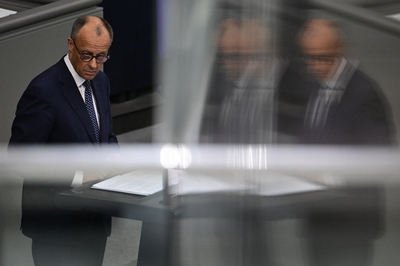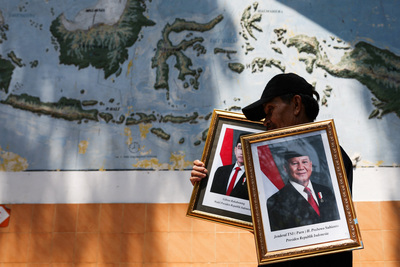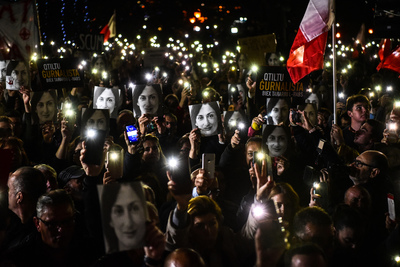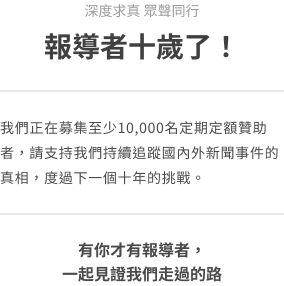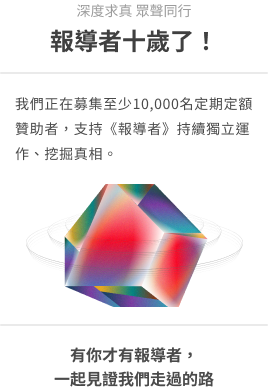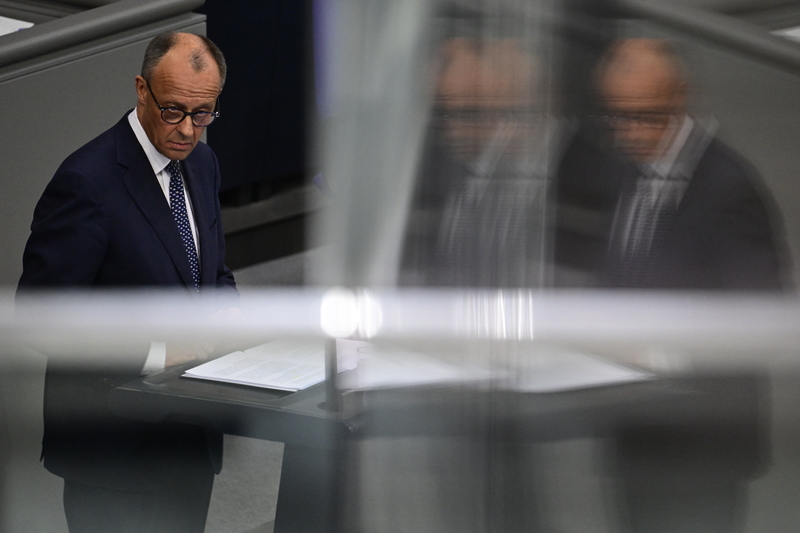
Germany likes to see itself as a reliable partner in international affairs, and it has for long assumed that not just its partners are reliable as well, but also its foes and their behavior.
What worked in dealing with them once, will work twice, will work thrice—so has often been the thinking. Cold War-era policies toward the Soviet-led Eastern Bloc were, for example, first applied to Russia in the 1990s and in 2000s to China as well.
The guiding principle was "Wandel durch Handel" ("engagement through trade"), a doctrine whose main objective is to foster better relationships despite adversity. It is seen as a main factor in the German reunification of 1989/1990. With regard to Moscow and Beijing, the hope was that if one engaged in trade with them on respectful, even terms, they would embark on a path toward "modernization", "strategic partnership", and "rule-of-law governance"—all those terms have been applied to the two countries by German government figures over the years.
Implicitly at least, the doctrine also had a security dimension: Trade creates mutual dependencies, and nations don't wage war against partners they depend on.
Friedrich Merz, who assumed the German chancellorship on May 6, has been a well-known figure in German politics since the late 1990s, when he rose to prominence during a leadership battle within his party, the center-right Christian Democratic Union (CDU).
His main opponent back then was the centrist Angela Merkel, who, as is obvious in hindsight, prevailed against him and went on to lead Germany as chancellor for 16 years until 2021. Merz, meanwhile, became a back-bencher in the Bundestag. He eventually left parliament in 2009 to work as a corporate lawyer, most prominently for investment company BlackRock, and held no positions in politics until 2022.
His public image, however, remained that of the bitter rival to the right of the long-serving chancellor, and talk of a potential return never died down. When Merkel began her gradual retreat from politics, first from the party leadership and then as chancellor, to be succeeded by Olaf Scholz of the center-left Social Democrats, Merz indeed returned into the spotlight. A year later he took over the CDU leadership himself, moved the party back to the right and another three years later he ousted Scholz as chancellor, despite his CDU-led Union alliance only winning 28 percent of the vote in a snap election. This nonetheless allowed it to enter a coalition with his predecessor's even more severely weakened Social Democrats.
The rivalry with Merkel and her centrist wing of the party, however, continued to loom large. Bloomberg, for example, titled, "Merz Rips up Merkel's Legacy" as he announced his public spending plans.
Merz had many major disagreements with Merkel—when he left parliament he said the Merkel CDU was no longer compatible with his "core beliefs"—but it has not been reported that he took issue with Wandel durch Handel, at least not at the time. Under Merkel, the latest version of the doctrine meant buying cheap energy from Russia and selling expensive German-made cars to Chinese customers—two core tenets of the German economic model that only unravelled recently.
Few statements from Merz regarding China are documented from the Merkel years, but it is safe to say that he didn't see a "systemic rival" arising in the east. As late as 2020, Merz instead spoke of China with apparent reverence for its trade policies, while never once calling for caution.
"China has just set up the world's largest free trade zone, and we are seriously discussing correct gender in draft laws?" he said in a political talk show at the time, revealing that he was more eager to engage with China in the arena of Wandel durch Handel than work through the nitty-gritty of democratic processes.
Moscow's invasion of Ukraine eventually forced the hand of the Scholz-led German government. Russia had cunningly created a situation where others depended on its energy sources, while striving for a high degree of economic independence and, thus, pain tolerance. Germany had to ramp up long-neglected defense spending and wean itself off of cheap Russian oil and gas, which had made up a large share of its energy imports—a move that weighs on the German economy until this day.
Wandel durch Handel also had to make way for a new approach taking into account that Russia had turned Germany's own doctrine on its head and used it against the country.
Scholz quickly called the dependence on Russia that had emerged under Merkel "a mistake" that will "not happen again," and European Commission President Ursula von der Leyen, who served as defense minister under Merkel, called the previous approach simply "wrong."
Merz chimed in with them. He claimed he never believed in Wandel durch Handel anyway and considered it "failed."
With regard to China, however, his assessment, and by extension that of his party, remained more nuanced to say the least.
"Germany will not be able to become independent of China in the next few years. But China will also not be able to be independent of the rest of the world," he said.
The idea that economic interdependence brings about peaceful coexistence, this time with China, remains a core tenet of German government thinking; new is just the robust focus on security and the critical assessment of its trading partners.
Aptly, the CDU re-coined the Wandel durch Handel doctrine "Sicherheit durch Handel" ("Safety through Trade").
Has Merz really learned his lesson, or would a potential Chinese aggression in the Indo-Pacific catch Germany blindsided?
Roderich Kiesewetter, a CDU lawmaker who has been an outspoken China critic for over a decade, says Merz has drawn the right conclusions from past mistakes.
"Compared with Scholz, Merz is someone who wants to take a much clearer stance," Kiesewetter told me during a videocall earlier this month. "However, he is also someone who can rethink his previous positions quickly and formulate new ones."
"I hope Friedrich Merz will act more strongly and wisely than Olaf Scholz, who was more interested in pleasing China," he said. "Friedrich Merz will certainly be more clearly on the side of the rules-based order than the previous administration."
Kiesewetter, who visited Taiwan as part of a German delegation last year, said he expects continuity in the government's Taiwan and China policies, but without the blunders of Merz's predecessor. He cited the sale of a terminal in the Port of Hamburg to a Chinese state-owned company—green-lighted by Scholz as an apparent concession shortly before his first trip to Beijing.
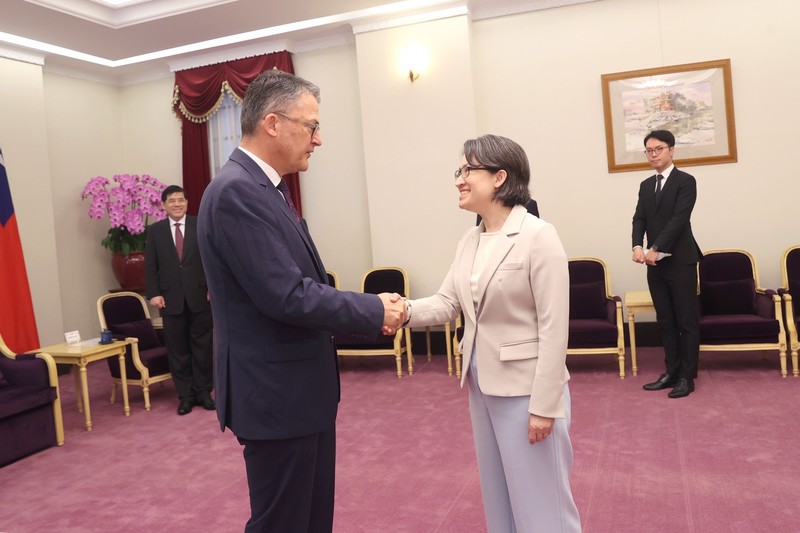
Kiesewetter said the CDU as a whole would also learn from its mistakes of the past, such as allowing Chinese companies Huawei and ZTE to gain stakes in Germany's railway and telecommunications infrastructure.
"I hope we are more humble now," Kiesewetter said. "The government follows the principle of 'Sicherheit durch Handel,' even though the new government sees China as a partner, competitor and rival. Publicly, the government avoids stressing that China is our rival, to avoid disadvantages in trade."
"However, it has become clear that the Chinese influence in Germany, facilitated by our friendly stance, has not become more peaceful," he said. "Instead we have large numbers of cyberattacks, attempts to siphon off information, spying ... as well as transnational repressions against people of national minorities [from China] and [Chinese] political dissidents."
Kiesewetter was among the few German officeholders who visited a protest held by Tibetans, Uighurs and Hong Kongers in Berlin during an official visit to Scholz by Chinese Premier Li Qiang. The protesters were only allowed to stay in a fenced-off, police-guarded area, while those who had come to celebrate Li Qiang and the Chinese Communist Party (CCP) could move about freely in front of the chancellery building—and just as freely could they take photos of the fenced-in counterprotesters from close range.
"In situations like this we see that appeasement didn't help us," Kiesewetter said. "It only made us look weak in the eyes of the Chinese."
Most independent experts in Germany share the view that mistakes have been made in dealing with China, but there's less of a consensus about what to expect from Merz.
Thorsten Benner is the director of the Global Public Policy Institute, a think tank in Berlin. He specializes in global security and technology, with focus on China and the Indo-Pacific. Having worked for the UN in New York and think tanks in the US, he's not known for wearing German, rose-tinted glasses when it comes to China and its influence.
With regard to the new government, Benner thinks Merz is in a uniquely strong position to initiate change, but unsure as to whether he will do so.
"There's much room to maneuver for the Merz government because [for the first time in decades] the chancellery, the foreign ministry and the economics ministry are in the hands of the same party," Benner said. "What kind of 'China politics chancellor' Merz wants to be, however, that's wide open, but I think he understands very well how serious the security situation is, that Germany's Indo-Pacific policies no longer are just about economics, but also have a security dimension."
Specifically, the German position hinges on the influence from "the few voices in the automotive industry who only see short term profits in China," Benner said—and how strong Merz will allow their influence to be.
The automotive industry is front and center among sectors that the Merz government has, in the words of Kiesewetter, identified as areas in which it will "exercise great caution" due to Germany's great dependence on China.
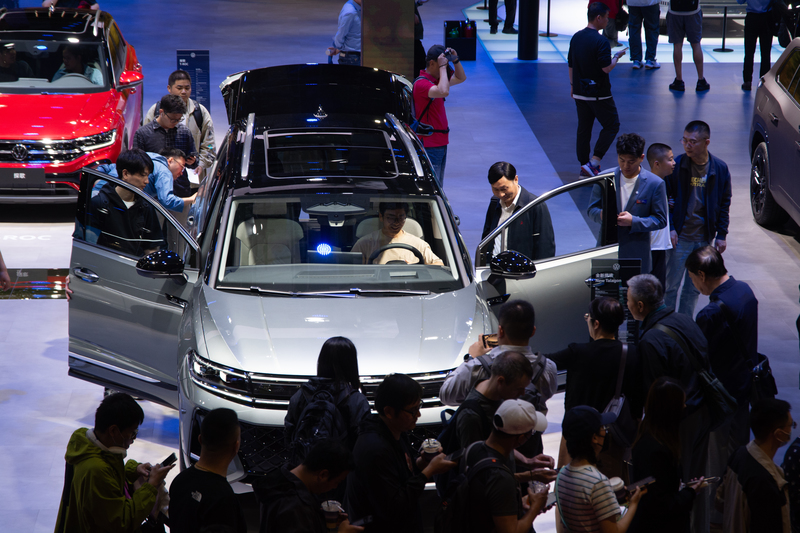
At its peak around 2020-2021, about 30 to 40 percent of the sales of German carmakers—Volkswagen, BMW, Mercedes, Audi, Porsche—were in China. Volkswagen had a market share of nearly 20 percent. Owning a German car was seen as the epitome of wealth in China, ever since VW Passat taxis—made by its Shanghai Volkswagen subsidiary since the 1980s—started to dominate city streets.
Then, in 2009, the Chinese government began to heavily subsidize its own carmakers—BYD, NIO, Geely and many others. Unlike in other countries, the aim of the subsidy program was not to shield local businesses from foreign competition, but, on the contrary, to stoke fierce competition among them, resulting in innovation, low prices, and eventually a consolidation in the domestic market and expansion abroad. It is part of China's strategy to become, as Kiesewetter described it, "the global technology leader in all relevant industries" by the 100th founding anniversary of the People's Republic of China in 2049.
German automakers initially lacked awareness of this ambitious plan and how quickly it was coming to pass. After COVID-19, when pandemic-related supply chain snarls subsided, German carmakers were "shocked about the speed of the transition," said Matthias Schmidt, founder of Berlin-based consultancy Schmidt Automotive Research.
Schmidt, a leading expert on German automakers' China exposure, said German companies had expected a much more gradual switch to domestic brands—but now they had to react quickly to their falling shares in their most important market.
Many of them generated more sales in China than at home in Germany.
Then pressure on the companies grew manifold when Russian troops began invading mainland Ukraine in 2022. In the first place it was because energy prices increased steeply, making car production in Germany less profitable. On the other hand, the carmakers, similarly to the German government, began to assess their potential vulnerabilities—that means exposure in markets to which they might lose access due to geopolitical turmoil.
"They began to ask themselves, 'What would happen if China got involved with Taiwan,'" Schmidt said, referring to potential sanctions and a sudden decoupling of the Western and Chinese markets in the event of a Chinese invasion or blockade.
The carmakers, too, began to see that China, which had on the eve of the Ukraine war thrown its weight behind Russia, might use economic leverage against Germany, and this time, the carmakers would be hit hardest. They began to focus more on other markets, which they had previously neglected—primarily the US—but they did so very slowly and carefully as they tried not to get caught in the US-China trade tensions.
"Germany [and its carmakers are] almost being held hostage by China because they're so exposed to the Chinese market," Schmidt said. "They can't necessarily say anything. They have to be very careful what they say publicly about China because ... China can flick a switch on the German economy overnight."
At times, the German car industry looked like China's staunchest ally in Europe. When the EU in 2024 sought to impose higher import tariffs on Chinese-made cars to counterbalance Beijing's subsidies and create a level playing field in the European car market, German manufacturers were against them—and the German government eventually opposed them, too.
The carmakers "were against the tariffs out of fear that China could retaliate against them," Schmidt said, adding that cheap access to the Chinese market was more important to them than protection from China's trading practices that the EU deemed "unfair."
"Their data showed that [European] customers of German cars don't switch to other brands that easily," Schmidt said, adding that French and Italian mass-market brands—Citroen, Peugeot, Renault, Fiat—are more vulnerable to losing customers to their new, Chinese competitors.
Merz is taking the helm at a time that feels challenging to many Germans. Aside from cost-of-living issues seen in many Western countries, Russia has forced thoughts of a wider European war back into the heads of many people—something that hadn't been considered possible after over 70 years of relative peace after World War II. Meanwhile, China and the possibility of an even bigger, global war, starting with an attack on Taiwan or a blockade of the country, is also looming in the minds of many Germans.
All three interviewees for this piece mentioned such a scenario unprompted.

And then Donald Trump returned to the White House. The first weeks of his second term as US president showed that a rift was widening between the US and its erstwhile European allies. At first it was largely rhetorical—from statements that aroused fears the US might effectively side with Russia in the Ukraine war, to musings that the US could annex Greenland—an autonomous territory of EU member Denmark that Germany and all other EU members would have to defend if it were to be attacked.
The Trump shock led to a stronger sense of cohesion in the EU, and there's little reason to believe Merz could turn his back on Germany's European allies anytime soon—all three interviewees for this piece dismissed the idea. His politics and leadership style are, in this respect at least, far away from those of Trump.
In others, Merz has shown his openness to simplistic, populist solutions to complex political problems. Despite falling refugee numbers, Merz has, for example, made curbing migration central to his agenda. This would include returning asylum seekers at the border—a plan that would, in best Trumpist fashion, openly defy a European Court of Justice ruling and call into question Europe's longstanding freedom of movement policy.
In terms of trade, however, Merz is a right-winger of a different, "pre-Trumpist" era. Rolling back regulations, pushing back against trade unions and promoting free trade are principles he has been advocating for for decades. Policies guided by a neoliberal thinking that was also prominent under Merkel will likely dominate his approach.
This could pose a problem in dealing with China, as Merz's general views on trade could limit his government's efforts to protect vulnerable sectors of the economy, Benner said.
Echoing Kiesewetter's warning that China is striving for global dominance in key sectors, Benner said the government's agenda "is pretty blind" in this regard.
The challenge posed by China is "something that Germany underestimates, something that [former] chancellor Scholz has underestimated, something that Merz has—at least up until now—underestimated, because his idea of competitiveness was based on an old way of thinking that understands it not as a competition between systems, but as a matter of deregulation. It's wide open whether he'll make this leap in his understanding," Benner said.
When Trump slapped 45 percent tariffs on all EU imports to the US in April, the idea to shift the focus back to China gained traction again immediately in Germany. The initially announced rate has been postponed, but the threat of tariffs that could debilitate trade remains.
Internally, some figures inside Merz's circle have floated the idea of a free-trade agreement with China again, Benner said.
A China-EU investment pact, coined the Comprehensive Agreement on Investment, was first brought forward by the Merkel government in 2020, but was ultimately withdrawn.
Carmakers, too, seem to see their future in China again—their shift away from China amid geopolitical risks has "come full circle virtually overnight," as Schmidt put it.
Volkswagen, for example, is now, for the first time ever, planning to sell electric vehicles in China that are not just made in the country, but are also developed there by local carmakers under a cooperation agreement. The cars would be Chinese-designed and made, catering to the needs of the Chinese market as precisely as possible; only the badge would be that of a German company. Others, such as BMW and Porsche, are focusing on the segments of the Chinese market where EVs haven't come to dominate—sports cars and other high-performance vehicles. The sale of such vehicles using internal combustion engines is set to be banned in China from 2035.
The Chinese government seems to be content with the development, especially with the rift that's widening between the US and Europe.
Right-wing parties have proven to be most susceptible to doing China's bidding in Europe. In Germany, that is the far-right Alternative für Deutschland—which Merz's Union is reluctant to cooperate with—and the secretive “China Bridge” association in the Bundestag, which is modeled after the US-focused Atlantic Bridge association—a group that is closely associated with prominent Union politicians. Merz served as Atlantic Bridge chairman from 2009 to 2019. No connection between him and the China Bridge is known.
Overall, there's little indication that Merz would ever go all-in on rekindling the close ties with China of the Merkel years, Benner said, even though he might be open toward "good, concrete offerings" from Beijing.
"The question is whether China will follow up with such concrete offerings," he said. "Till date, there's not much. It rather seems like China is thinking, 'Europe is in such a precarious position, we won't have to do much. Europe will come to us.'"
Kiesewetter assessed the situation similarly, especially with regard to German companies and their exposure in China.
"I firmly believe Germany will make decisions pragmatically on a case-by-case basis, in part driven by the German industry," Kiesewetter said, adding that many German firms are maintaining a China-friendly stance even though they know "they don't own a single screw in China" and that Beijing can withdraw support at a moment's notice.
When it comes to Taiwan, Kiesewetter is cautiously optimistic, even though he believes much hinges on whether the US will continue to take a leading role among the world's democracies.
"The [German] government is not yet ready to say, 'Yes, there is a China, it's the People's Republic of China, but Taiwan is an independent republic,'" he said, adding that Germany has at least become increasingly aware that fewer and fewer Taiwanese identify as Chinese.
"I hope naval exercises will certainly become more common, such as the passage of [German vessels] through the Taiwan Strait," he said. "I think that would be very wise."
This is because the Merz government, as Kiesewetter put it, understands that a potential Chinese assault on Taiwan—whether military, economic or hybrid—would "lead to a reorganization of the global economy."
"Europe must quickly establish value chains there, in case Taiwan gets attacked," he said, adding that another worst-case scenario is also possible: a consensus over the unification of Taiwan with China "manufactured" by Beijing.
"What do you do if this mutually agreeable solution is achieved through a hybrid attack, maybe an energy blockade, [or] if China offers Taiwan the exchange of Taiwan dollars for renminbi at a one-for-one rate"? Kiesewetter said, adding that wealthy Taiwanese living in China would put pressure on the Taiwanese government as they expect their wealth to quadruple.
Still, Taiwan's leverage is not lost on Berlin.
"Taiwan's expertise and power to innovate serve as a reassurance that Japan, the US and Europe have an interest in maintaining Taiwan's integrity," Kiesewetter said.
Whether Merz is ready to transform that understanding into action is a question that will shape Germany's China policy—and its role in the Indo-Pacific going forward.
(To read Chinese version of this article, please click: 柏林的焦慮:困在美中新冷戰、電動車與台海危機的德國,將修正中國政策?)
深度求真 眾聲同行
獨立的精神,是自由思想的條件。獨立的媒體,才能守護公共領域,讓自由的討論和真相浮現。
在艱困的媒體環境,《報導者》堅持以非營利組織的模式投入公共領域的調查與深度報導。我們透過讀者的贊助支持來營運,不仰賴商業廣告置入,在獨立自主的前提下,穿梭在各項重要公共議題中。
今年是《報導者》成立十週年,請支持我們持續追蹤國內外新聞事件的真相,度過下一個十年的挑戰。

